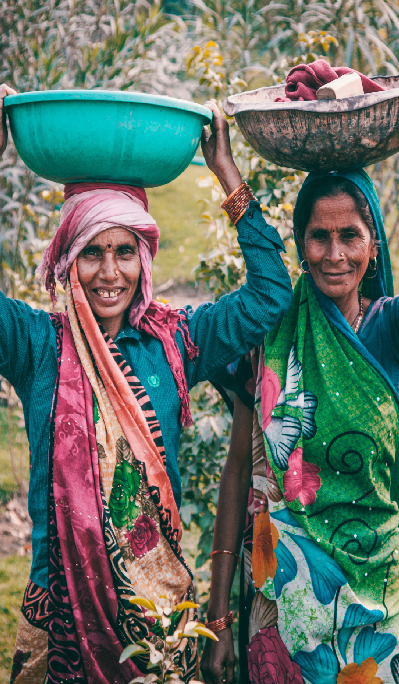CREATING TOURISM HAPPINESS IN KOSHI PROVINCE

Koshi Province is one of the seven provinces in Nepal, located in the eastern part of the country. It was formed after the adoption of the new constitution of Nepal in 2015, which restructured the country into a federal system. Koshi Province shares its borders with Tibet Autonomous Region of China to the north, Madhesh Province and Bagmati Province to the west, and India to the south and east. The province has an area of 25,905 square kilometers and consists of 14 districts, including Jhapa, Morang, Sunsari, Dhankuta, Tehrathum, Sankhuwasabha, Bhojpur, Panchthar, Solu Khumbu, Okhaldhunga, Udayapur, Khotang, Ilam, and Taplejung.
Koshi Province is known for its rich natural and cultural diversity. It encompasses the fertile plains of the Terai region, the lush hills of the Mahabharat Range, and the towering peaks of the Himalayas, including the world's highest peak, Mount Everest. The region is home to diverse ethnic groups, including Rai, Limbu, Sherpa, Tamang, Newar, Brahmin, Chhetri, and others, each with its own unique culture, traditions, and way of life.
The province is endowed with abundant natural resources, including forests, rivers, lakes, and wildlife, making it a haven for nature lovers and adventure seekers. It is also rich in cultural heritage, with numerous religious and historical sites, temples, monasteries, and traditional arts and crafts that reflect the region's rich history and cultural diversity. The people of Koshi Province are known for their warm hospitality and friendly nature, making it a welcoming destination for travelers. The region offers a range of tourism activities, including trekking, mountaineering, wildlife viewing, cultural tours, adventure sports, and homestays, providing a unique and authentic experience for tourists.
Economically, Koshi Province is primarily based on agriculture, with major crops including paddy, maize, wheat, tea, cardamom, and ginger. The region also has significant hydropower potential, with several rivers and streams that can be harnessed for electricity generation. Additionally, tourism is a growing industry in the province, with its diverse natural and cultural attractions drawing tourists from around the world.
However, like any other region, Koshi Province also faces challenges related to tourism development, including environmental degradation, inadequate infrastructure, socio-cultural impacts, and economic disparities. Therefore, there is a need for sustainable and responsible tourism practices that ensure the well-being of local communities, preserve the natural and cultural heritage, and contribute to the overall happiness and prosperity of the region.
Nature-based tourism: Koshi Province is blessed with stunning natural landscapes, including the Himalayas, hills, forests, and rivers, which offer ample opportunities for nature-based tourism. Trekking, mountaineering, wildlife viewing, birdwatching, and camping are some of the popular activities that can attract nature lovers and adventure seekers.
Cultural tourism: Koshi Province has a rich cultural heritage, with diverse ethnic communities, traditions, festivals, and historical landmarks. The region is home to various indigenous communities like Rai, Limbu, Sherpa, Tamang, and others, each with its unique cultural practices, arts, and crafts. Cultural tourism can involve visiting traditional villages, experiencing local festivals, exploring ancient temples, and learning about the customs and traditions of the local people.
Adventure tourism: With its Himalayan landscapes and rivers, Koshi Province offers exciting adventure tourism opportunities, including trekking, mountaineering, white-water rafting, paragliding, and other adventure sports. Adventure tourism can attract thrill-seekers and adventure enthusiasts who are interested in challenging outdoor activities.
Pilgrimage tourism: Koshi Province is also known for its religious and pilgrimage sites, which can be a significant prospect for tourism. Places like Pathibhara Temple, Halesi Mahadev, Siddhakali Temple, and others are revered by Hindu and Buddhist pilgrims and can attract religious tourists seeking spiritual experiences.
Tea and agrotourism: Ilam, a district in Koshi Province, is known for its tea gardens and agrotourism opportunities. Tea lovers and agro-tourists can visit tea estates, learn about tea processing, and experience the local agricultural practices, which can be an interesting prospect for tourism.
Rural tourism: Koshi Province has several rural areas with picturesque landscapes and traditional lifestyles, offering opportunities for rural tourism. Visitors can experience the rural way of life, participate in local activities, and learn about traditional farming practices, handicrafts, and cuisine, which can provide an authentic cultural experience.
Ecotourism: The province has several protected areas like Koshi Tappu Wildlife Reserve and Makalu Barun National Park, which offer opportunities for ecotourism. Ecotourism can involve exploring unique ecosystems, promoting conservation efforts, and supporting local communities through sustainable tourism practices.
It's important to note that the development of tourism in Koshi Province, or any other destination, should be carried out in a sustainable manner, considering the local communities, environment, and cultural heritage. Proper planning, infrastructure development, community involvement, and sustainable tourism practices can help harness the prospects of tourism in Koshi Province in a responsible manner, benefiting both tourists and local communities.
Koshi Province of Nepal, located in the eastern part of the country, is a region rich in natural beauty, cultural diversity, and adventure tourism opportunities. With its towering peaks, diverse flora and fauna, and unique ethnic communities, Koshi Province has the potential to create tourism happiness - a concept that focuses on ensuring sustainable and responsible tourism practices that benefit both tourists and local communities.
How Koshi Province can create tourism happiness through various initiatives and strategies.
Promoting Sustainable Tourism: Sustainable tourism practices are crucial for creating tourism happiness in Koshi Province. This includes responsible waste management, conservation of natural and cultural resources, and minimizing the negative impact of tourism on the environment. Promoting sustainable tourism practices such as eco-trekking, waste management programs, and supporting local conservation initiatives can help protect the region's pristine natural beauty and cultural heritage for future generations.
Engaging Local Communities: Involving local communities in tourism planning, development, and decision-making processes is essential for creating tourism happiness. Local communities, including ethnic groups like Sherpas, Rai, Limbu, and Tamang, are the custodians of the region's culture and traditions. Engaging them in tourism initiatives, such as community-based tourism, homestays, and cultural performances, not only provides economic opportunities but also helps preserve their unique way of life and fosters cultural exchange between tourists and locals.
Empowering Local Economies: Tourism can be a powerful tool for economic development in Koshi Province. Creating tourism happiness involves empowering local economies by promoting local products, services, and livelihoods. This can be achieved by encouraging tourists to buy locally made handicrafts, supporting local food and accommodation providers, and promoting agro-tourism initiatives that showcase the region's agricultural practices. By supporting local economies, tourism can become a sustainable source of income for local communities, leading to increased happiness and well-being.
Enhancing Tourist Experiences: Enhancing tourist experiences is crucial for creating tourism happiness in Koshi Province. This can be achieved by providing high-quality tourism products and services that meet the expectations of tourists. Improving the infrastructure, including transportation, accommodation, and other amenities, can enhance the comfort and safety of tourists. Additionally, providing unique and authentic experiences such as cultural tours, traditional music and dance performances, and adventure activities like trekking and mountaineering can create memorable and fulfilling experiences for tourists, leading to increased happiness and satisfaction.
Fostering Cross-Cultural Exchange: Tourism provides an opportunity for cultural exchange between tourists and local communities, leading to mutual understanding and appreciation. Creating platforms for cross-cultural exchange, such as cultural festivals, interactive cultural programs, and homestays, can foster meaningful connections between tourists and locals. This not only enriches the travel experiences of tourists but also promotes tolerance, respect, and understanding among different cultures, contributing to tourism happiness.
Educating and Engaging Tourists: Educating and engaging tourists in responsible tourism practices is crucial for creating tourism happiness. Promoting responsible travel practices, such as respecting local cultures, traditions, and the environment, and encouraging tourists to minimize their impact on local communities and the natural environment, can create awareness and promote responsible tourism behavior. Engaging tourists in conservation initiatives, community-based tourism activities, and local cultural experiences can create a sense of purpose and fulfillment, contributing to their overall happiness.
Collaborating with Stakeholders: Collaborating with various stakeholders, including local governments, NGOs, tour operators, and other relevant organizations, is vital for creating tourism happiness in Koshi Province. This involves developing partnerships and networks to promote sustainable tourism practices, share resources and knowledge, and ensure that tourism benefits are equitably distributed among local communities. By working together, stakeholders can address challenges and harness opportunities to create a more inclusive and responsible tourism industry in Koshi Province.
Local governments play a critical role in tourism development and management. They can create and enforce regulations and policies that promote sustainable tourism practices, protect natural and cultural resources, and ensure that local communities benefit from tourism. Local governments can also invest in infrastructure development, such as roads, transportation, and waste management facilities, to improve the overall tourism experience and enhance the well-being of local communities.
Non-governmental organizations (NGOs) can play a vital role in promoting responsible tourism practices and advocating for the rights and well-being of local communities. They can work with local communities to develop community-based tourism initiatives, provide capacity-building support, and raise awareness about the importance of sustainable tourism among tourists and other stakeholders. NGOs can also collaborate with local governments and tour operators to develop and implement sustainable tourism strategies and initiatives.
Tour operators and other relevant organizations are crucial stakeholders in the tourism industry. They can play a significant role in promoting responsible tourism practices by offering sustainable tour packages, ensuring fair wages and working conditions for their employees, and supporting local communities through economic initiatives. Tour operators can also engage in responsible marketing practices that promote the unique cultural and natural heritage of Koshi Province, while respecting the rights and values of local communities.
In addition to local governments, NGOs, and tour operators, collaboration with other relevant organizations is also essential for creating tourism happiness in Koshi Province. This may include academic institutions, research organizations, industry associations, and other stakeholders who can contribute their expertise and resources to sustainable tourism initiatives. Collaborative efforts can involve joint research and monitoring of tourism impacts, sharing of best practices, and coordination of tourism events and activities.
Through effective collaboration among stakeholders, Koshi Province can develop a shared vision for sustainable and responsible tourism that aligns with the principles of tourism happiness. This involves regular communication, consultation, and engagement among stakeholders to ensure that tourism development strategies are inclusive, transparent, and accountable. It also requires the establishment of mechanisms for monitoring and evaluating the impacts of tourism on local communities, natural resources, and cultural heritage, and taking corrective actions as needed.
Tourism can contribute to happiness in several ways:
New experiences and cultural exchange: Tourism provides an opportunity to explore new destinations, cultures, and lifestyles, which can broaden one's horizons and create new experiences. Meeting people from different backgrounds, learning about their customs and traditions, and exchanging ideas and perspectives can be enriching and fulfilling, leading to increased happiness.
Rest and relaxation: Taking a break from daily routines and indulging in leisure activities during a vacation can help reduce stress, rejuvenate the mind and body, and improve overall well-being. Relaxing at a beach, enjoying a spa treatment, or simply taking a leisurely stroll in nature can contribute to a sense of relaxation and happiness.
Quality time with loved ones: Tourism often involves traveling with family, friends, or loved ones, providing an opportunity to strengthen relationships and create lasting memories. Spending quality time together, engaging in shared activities, and creating cherished moments can enhance happiness and emotional well-being.
Personal growth and self-discovery: Traveling can be a journey of self-discovery, allowing individuals to step out of their comfort zones, challenge themselves, and gain new perspectives about themselves and the world. Trying new things, overcoming obstacles, and discovering hidden talents or interests can boost self-esteem, self-confidence, and happiness.
Appreciation of nature and cultural heritage: Tourism can foster a sense of appreciation and awe for the natural beauty and cultural heritage of a destination. Visiting pristine natural landscapes, historical sites, or cultural landmarks can evoke a sense of wonder, admiration, and connection with the world around us, leading to increased happiness.
Positive impact on local communities: Sustainable tourism practices that promote community involvement, cultural preservation, and economic benefits to local communities can also contribute to happiness. Knowing that one's travel choices are making a positive impact on local people, supporting their livelihoods, and conserving their culture and environment can generate a sense of fulfillment and happiness.
It's important to note that the relationship between tourism and happiness can vary depending on individual preferences, expectations, and experiences. Not all tourism experiences may result in happiness for everyone, and factors such as personal mindset, travel choices, and destination characteristics can influence the outcomes. Responsible and sustainable tourism practices that prioritize the well-being of both travelers and local communities can help maximize the potential for tourism to contribute to happiness.
In conclusion, Koshi Province of Nepal is a diverse and beautiful region with immense tourism potential. Its unique natural and cultural heritage, warm hospitality of its people, and growing tourism industry make it an attractive destination for travelers seeking authentic experiences. However, to create tourism happiness in Koshi Province, it is crucial to collaborate with various stakeholders, including local governments, NGOs, tour operators, and other relevant organizations, to promote sustainable tourism practices, empower local communities, and ensure that tourism benefits are equitably distributed. By working together, Koshi Province can achieve responsible and inclusive tourism development that contributes to the well-being of local communities, protects the environment, and promotes the happiness of all stakeholders involved. Creating tourism happiness in Koshi Province of Nepal requires the collaborative efforts of local governments, NGOs, tour operators, and other relevant organizations. Through partnerships and networks, stakeholders can promote sustainable tourism practices, empower local communities, enhance tourist experiences, foster cross-cultural exchange, educate, and engage tourists, and ensure that tourism benefits are equitably distributed. By working together, stakeholders can create a tourism industry that contributes to the well-being of local communities, preserves the natural and cultural heritage of the region, and provides fulfilling and meaningful experiences for tourists, leading to tourism happiness in Koshi Province of Nepal.



